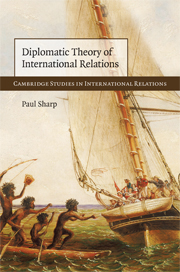Book contents
- Frontmatter
- Contents
- Acknowledgements
- Introduction
- Part I Traditions of international thought and the disappointments of diplomacy
- 1 Diplomacy and diplomats in the radical tradition
- 2 Diplomacy and diplomats in the rational tradition
- 3 Diplomacy and diplomats in the realist tradition
- Part II Elements of a diplomatic tradition of international thought
- Part III Diplomatic understanding and international societies
- Part IV Thinking diplomatically about international issues
- Conclusion
- Bibliography
- Index
- Cambridge Studies in International Relations
1 - Diplomacy and diplomats in the radical tradition
Published online by Cambridge University Press: 05 June 2012
- Frontmatter
- Contents
- Acknowledgements
- Introduction
- Part I Traditions of international thought and the disappointments of diplomacy
- 1 Diplomacy and diplomats in the radical tradition
- 2 Diplomacy and diplomats in the rational tradition
- 3 Diplomacy and diplomats in the realist tradition
- Part II Elements of a diplomatic tradition of international thought
- Part III Diplomatic understanding and international societies
- Part IV Thinking diplomatically about international issues
- Conclusion
- Bibliography
- Index
- Cambridge Studies in International Relations
Summary
What sort of places do diplomacy and diplomats occupy in each of Wight's three traditions of international thought? I am interested particularly in the accounts they provide of what diplomats do and the explanations they offer for how they accomplish it. I begin with the radical tradition partly because it is customary to leave it until last. More importantly, it is easy to suppose that resistance to the plural “fact” of human existence upon which my characterization of diplomacy rests will be strongest within this tradition. Why so? Our stories of the origins of diplomacy and, indeed, international relations often start with imagined encounters between groups of people who, until that point, did not merely regard themselves as separate, but were not even aware of each other's existence. As in Harold Nicolson's version, the first moment in international relations occurs at the point of contact between different groups. The second occurs when they institute an exception to the general injunction to kill and eat all outsiders in the form of immunity for heralds and messengers. This is a plausible origin myth. It may capture aspects of what actually happened on numerous occasions, and I shall make use of it below. Nevertheless, both anthropological research into prehistoric societies and a modest exercise of the imagination suggest that this is not the only possible point of departure for a story about the origins of international relations.
- Type
- Chapter
- Information
- Diplomatic Theory of International Relations , pp. 17 - 38Publisher: Cambridge University PressPrint publication year: 2009



